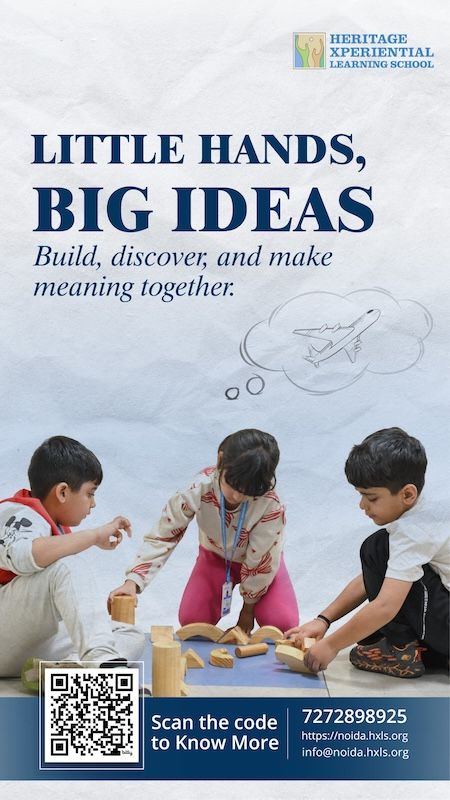Introduction
In today’s competitive academic environment, it has become increasingly important for students to not only excel in their studies but also engage in extracurricular activities that contribute to their overall development. As a parent, witnessing a child grow and thrive in both academics and extracurricular pursuits can be one of the most fulfilling experiences. However, balancing these aspects often becomes a challenge. At The Heritage School, one of the Best CBSE Schools in Noida, this article will delve into how parents can effectively support their children in managing this balance, while highlighting the importance of extracurricular activities in shaping a well-rounded individual.
About Us: The Heritage School, Noida
At The Heritage School, Noida, we understand the delicate balance between academics and extracurricular activities. Parents often express their appreciation for how our school fosters a well-rounded education, allowing children to excel both inside and outside the classroom.
Our curriculum is designed to not only focus on academic excellence but also to provide opportunities for students to engage in various extracurricular activities like sports, music, drama, and cultural events. Through programs such as our annual sports day and creative arts exhibitions, students develop crucial life skills like time management, teamwork, and leadership. This approach ensures that students grow holistically, preparing them for the challenges of the future.
The Role of a Balanced Education
A balanced education is one that nurtures both the academic and extracurricular sides of a student. Schools that adopt this philosophy understand the significance of providing an environment where students can flourish in academics, sports, arts, and leadership activities.
For parents, the role of supporting children in this balanced approach is crucial. They must encourage their children to embrace opportunities outside the classroom, while also ensuring that academic responsibilities are met. The challenge lies in managing both aspects without compromising one for the other.
Why Extracurricular Activities Matter
1. Social Skills Development
By participating in group activities or team sports, students learn valuable social skills such as communication, teamwork, and conflict resolution.
2. Time Management
Balancing studies with extracurriculars teaches students how to prioritize tasks, set goals, and meet deadlines—skills that will serve them well in higher education and beyond.
3. Boosting Confidence
Activities like drama or public speaking help students overcome shyness, build confidence, and enhance self-esteem.
4. Cognitive and Physical Health
Sports and physical activities improve overall well-being while boosting focus and energy for academics.
5. Exploration of Interests
Extracurriculars allow students to discover their passions, whether it’s music, sports, or leadership roles.
The Parent’s Role in Supporting Extracurricular Involvement
Encourage Participation but Set Boundaries
Parents should encourage involvement while ensuring students don’t overcommit themselves.
Create a Routine and Prioritize Time Management
Building a daily schedule helps students balance studies and activities without stress.
Provide Emotional Support
Parents should reassure children, listen to their concerns, and encourage breaks when needed.
Foster a Growth Mindset
Encouraging children to view challenges as opportunities builds resilience and motivation.
Be Involved in Their Interests
Attending plays, sports events, or practice sessions shows children that their efforts are valued.
Modeling Work-Life Balance
Parents can inspire children by demonstrating a healthy balance between work and personal time.
The School’s Role in Fostering Extracurricular Growth
Schools play a vital role by offering diverse extracurricular opportunities such as sports, arts, debates, and Model United Nations (MUN). Events, mentorship programs, and competitions allow students to showcase their talents and build essential life skills.
The Importance of Choice in Extracurricular Activities
Giving students autonomy to choose activities that match their interests ensures commitment and enthusiasm. A choice-driven approach keeps students motivated and prevents burnout.
Setting Realistic Expectations
Parents should set achievable goals and avoid comparisons with other children. The focus should be on personal growth, enjoyment, and perseverance.
Conclusion
Balancing studies with extracurricular growth is undoubtedly challenging, but also one of the most rewarding aspects of a child’s development. At The Heritage School, Noida, by supporting their child’s extracurricular involvement, fostering routines, and providing emotional guidance, parents can help children achieve a well-rounded education.
With the right guidance and encouragement, students can thrive in both academics and extracurricular passions, preparing them to become confident, successful individuals.
FAQs
Q1: How can I help my child balance academics and extracurricular activities?
Encourage time management, set realistic goals, and ensure they prioritize both studies and hobbies.
Q2: Does The Heritage School Noida offer programs for both academic and extracurricular growth?
Yes, The Heritage School Noida provides a well-rounded curriculum with ample opportunities for extracurricular involvement.
Q3: How do extracurricular activities affect my child’s academic performance?
Extracurriculars build life skills like time management and teamwork, which enhance academic focus.
Q4: What are some effective time management tips for students balancing both studies and extracurriculars?
Create a daily schedule, prioritize tasks, and make time for rest and hobbies.
Q5: Can extracurriculars help in developing social and leadership skills?
Yes, activities at The Heritage School Noida foster collaboration, leadership, and social engagement.
Q6: How can parents support their child in balancing extracurricular activities and academics?
Provide encouragement, monitor well-being, and help with organization to avoid burnout.

